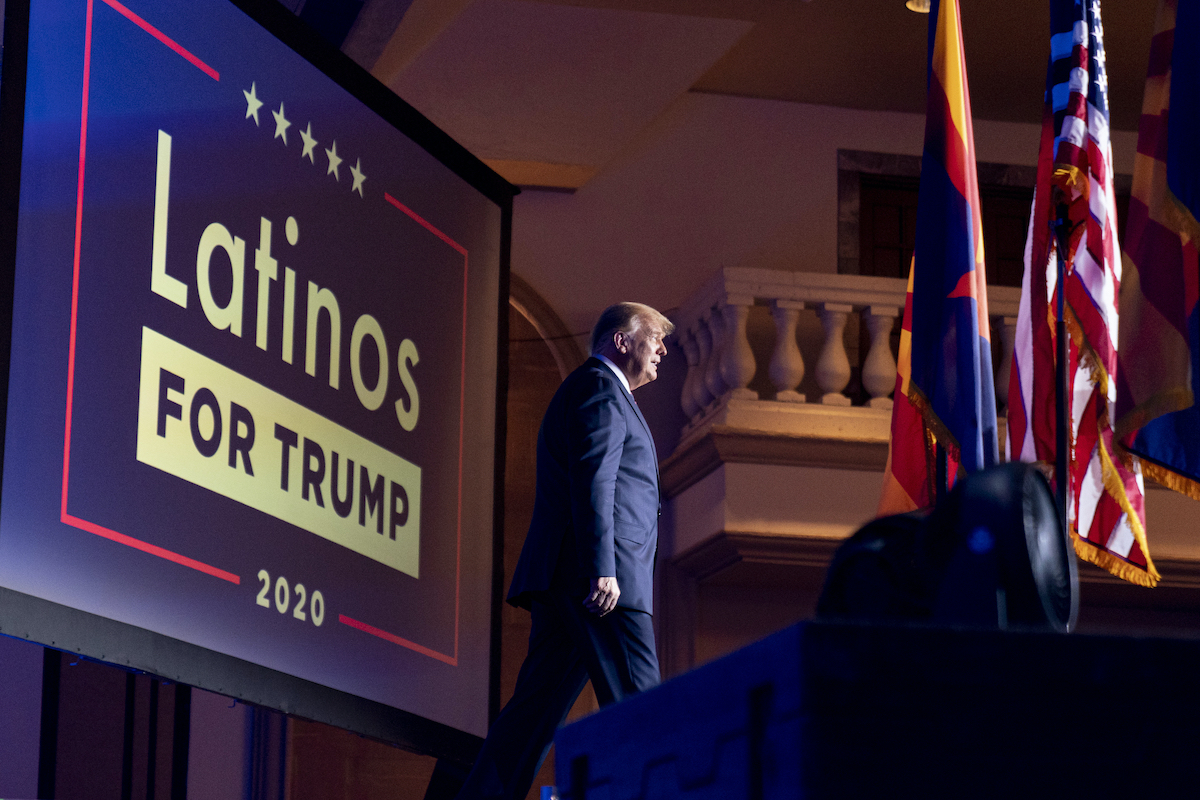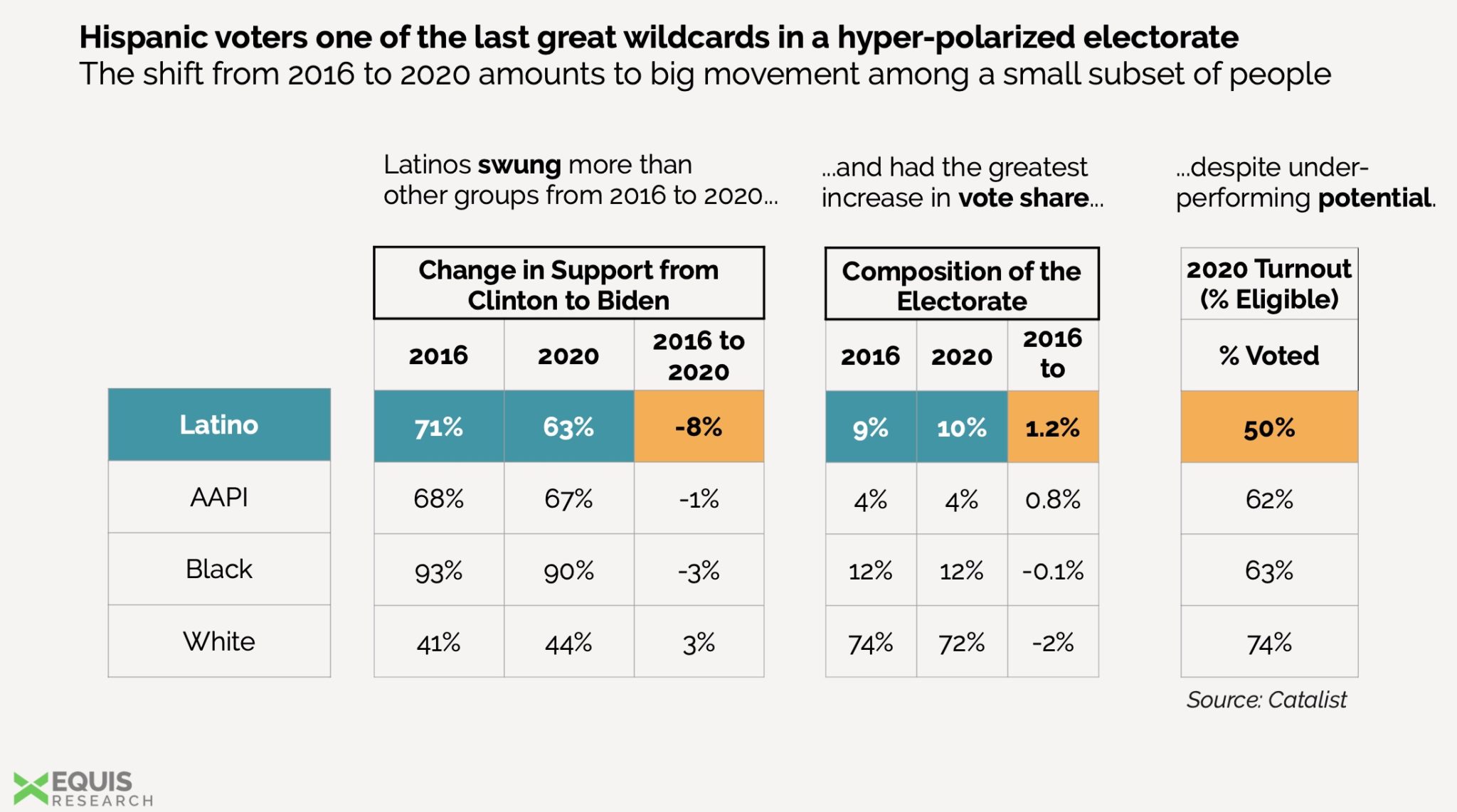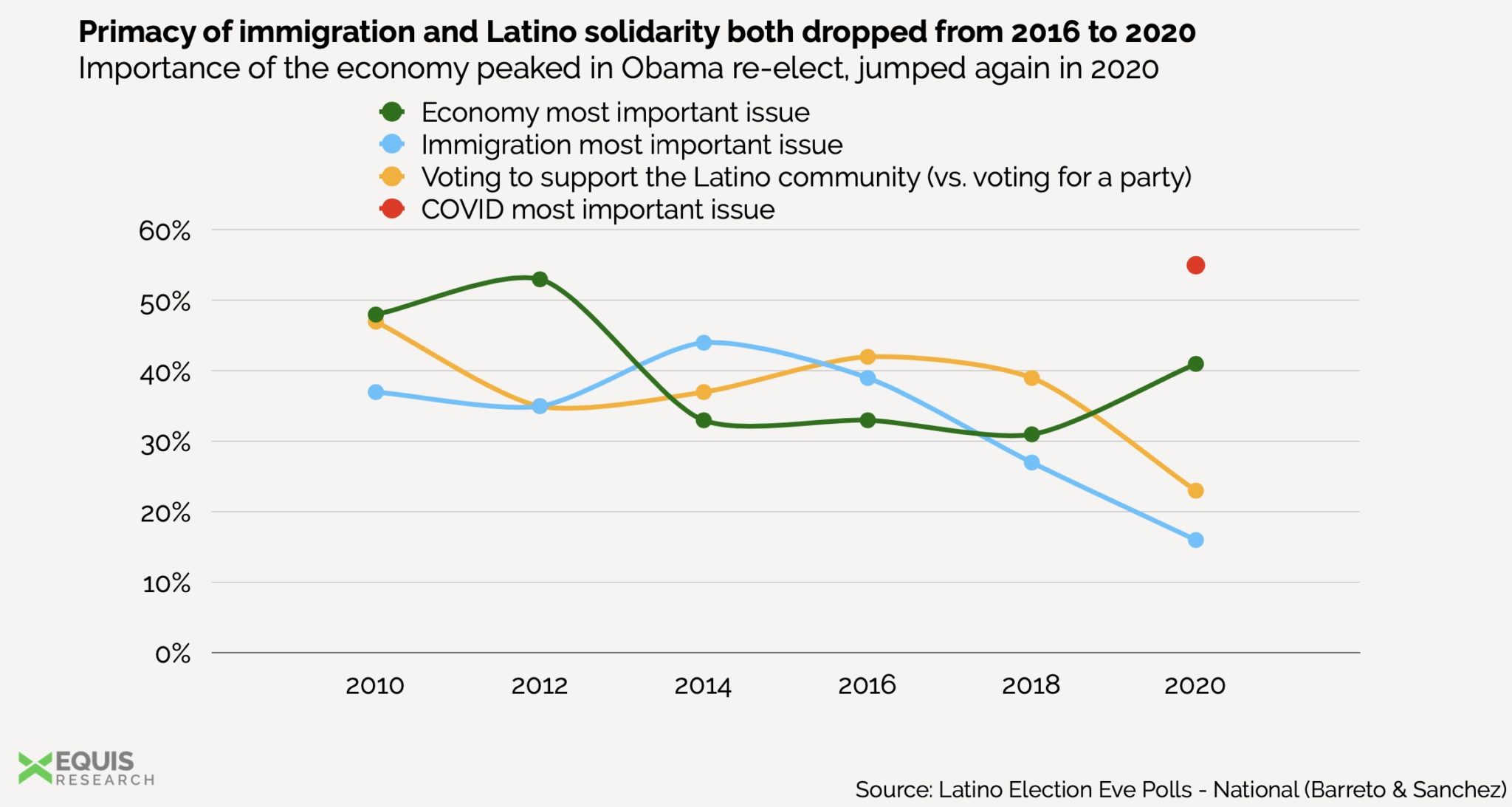

In this September 14, 2020 file photo, President Donald Trump arrives for a Latinos for Trump Coalition roundtable at Arizona Grand Resort & Spa in Phoenix. (AP Photo/Andrew Harnik, File)
Earlier this year, a 2020 postmortem by Equis Labs concluded that the growing U.S. Latino electorate, which experienced a historic turnout, is still very persuadable due to very little overall outreach investment in the community.
On Tuesday, Equis followed up that postmortem with a new 105-page report that attempts to explain what issues drove U.S. Latinos to vote in 2020 and why some of them shifted their preferences from 2016.
Titled “The American Dream Voter,” the second part of the postmortem report revealed three major findings:
- “The debate over whether to prioritize the economy or public health in the middle of COVID —a debate that became, for some, about the value of hard work and the American Dream— created a permission structure for formerly hesitant Latinos to embrace [Donald] Trump’s candidacy.”
- “Movement toward Trump coincided with one-sided attention lavished on key issues and geographies, part of a larger story about the impact of uncontested communication and the consequences of voters feeling forgotten or unheard.”
- “The thing about less-partisan Latinos: they are navigating their identities and values in ways that don’t always map out neatly on the political spectrum and aren’t always consistent. That makes campaigns, policy action, and media all the more impactful. Few of the opinions or dynamics we include in this report are static—they can also be shaped by parties going forward.”
“What we saw really was big movement among a small set of voters,” Carlos Odio, co-founder of Equis Labs, told Latino Rebels on Tuesday. “Joe Biden still wins a majority of the Latino vote but on the margins. Donald Trump made these gains, which in the context of an electorate that is generally pretty static, it’s still significant. That’s why now we have a lot of narratives and there is a lot of attention being paid by the media on these gains.”


“Trump spent four years in some places and maybe closer to two years in other places relentlessly campaigning for this vote in a way that he hadn’t in 2016,” Odio added. “And he was talking to voters on issues and in places where they sometimes feel neglected. In certain places, he was holding on to an issue and making it way more important, owning that issue. And there was no competition from Democrats.”
The economy, especially in the context of COVID, led to a shift to more favorable Trump support, “opening a way for some Latinos who found it unacceptable to vote for him in 2016,” the report said. It also acknowledged that the Trump campaign’s claim that voting Democrat was a push for “socialism” did indeed create “a space for defection” which was “concentrated on people getting media from WhatsApp and right-wing outlets, along with those who most believe in social mobility through hard work (aka the American Dream).”
In relation to the American Dream, the report said that “Democrats retain some natural credibility with Latino voters but have lost ground on workers, work and the American Dream; they’re also open to attack for taking Hispanics for granted; Republicans have some openings but are still held back by their image as the uncaring party of big corporations.”
When it came to specific places like South Florida and South Texas where Trump did well with Latinos, the report explained that these two examples showed “what happens when a candidate is allowed a one-sided advantage on a highly resonant issue (socialism in one, border security in the other).”
Then there is the issue of immigration, which the Equis report noted was not a priority for Latinos in 2020—in fact, it was the lowest when compared to COVID (top issue), the economy (2nd top issue) and voting to support the community versus voting for a party (3rd top issue).


“Healthcare, education and immigration were the cornerstones of Latino support for Democrats,” Odio said, noting that healthcare was a big issue in the 2012 cycle and that the immigration debates of 2006 and 2007 led the foundation for how Latinos have viewed both political parties for the 15 years.
“Immigration might have lost a bit of power because there hasn’t been immigration reform, because we are here 15 years later, and there is no reform,” explained Odio, the deputy Latino vote director for the 2008 Obama campaign and a former White House staffer. “It just goes to show you the extent the debate right now is being set on Republican terms.”
As the report noted, “By the middle of 2020, neither views on immigration nor the role of Hispanic identity were showing a major effect on vote choice—they were no longer cleanly differentiating Trump voters from Democratic voters.”
In addition, the report contained several focus group quotes from participants such as this one from a Democratic voter who said, “In the last elections, 2016, I didn’t vote. For me, I saw [Trump] as a clown. He’s a clown… But he changed my mind. In my case, I felt a difference in stability. And he was running the country. Things that were problems [for] a long time, he came in and did something about them quickly at the beginning… He was doing things, not just talking about them.”
The report utilized several data points including but not limited to the following:
- A Texas survey of 1,400 Latino voters who voted in 2020
- A Florida statewide survey of 700 Latino voters who voted in 2020 and a separate survey of 700 non-Cuban, non-Puerto Rican Latinos in Miami-Dade/Broward who voted in 2020
- A national survey of 1,200 Latinos who voted in 2020 with focus groups in Florida, Texas and Arizona, as well as ethnographic interviews in Texas
- A series of 40,880 total interviews from 2019-2020.
This latest report follows a trend of Latino voters becoming increasingly independent in their motivations. In August 2020, a Telemundo/BuzzFeed News poll showed less support for Biden and the Democratic Party among young Latino voters than either young Black or Asian American voters, and just last week a poll conducted by the Wall Street Journal showed Latino voters evenly split between the two main parties.
The complete 105-page report from Equis Labs is below:
****
Julio Ricardo Varela is founder of Latino Rebels, part of Futuro Media. He tweets from @julito77.



[…] 2020 postmortem of U.S. Latinos based on several data points and focus groups confirmed what so many observers of […]
[…] 9314 post mórtem de latinos estadounidenses basado en varios puntos de datos y grupos focales confirmaron lo que […]
[…] 2020 postmortem of U.S. Latinos based on several data points and focus groups confirmed what so many observers of […]
[…] 2020 postmortem of U.S. Latinos based on several data points and focus groups confirmed what so many observers of […]
[…] 2020 postmortem of U.S. Latinos based on several data points and focus groups confirmed what so many observers of […]
[…] 2020 postmortem of U.S. Latinos based on several data points and focus groups confirmed what so many observers of […]
[…] 2020 postmortem of U.S. Latinos based on several data points and focus groups confirmed what so many observers of […]